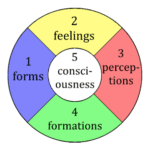
Zen Buddhism Meditation has 5 different levels of practice. These increase in difficulty and decrease in complexity as the practitioner progresses.
| Zazen Type (Japanese Characters) | Description |
|---|---|
| 本普 (Hompu) | Basic ability to meditate, used to make existence easier |
| 外道 (Gedō) | Joining with non-Zen methods |
| 小乗 (Shōjō) | Soso Tharpa, meditating on non-self and freedom |
| 大乗 (Daijō) | Emptiness and compassion, Bodhisattvic ideal |
| 最上乗 (Saijōjō) | Silent Illumination, Shikantaza, Peak of meditative objects, no reference point of focus |
Secrets of Meditation for Anxiety
Like millions of people, you may have suffered from anxiety for years. Meditation, yoga, peaceful music – it never works. It takes too long, and it’s not stable. Why? Because peace is treated as a cause for freedom, but it’s not – it’s the result. The cause to free yourself from anxiety is completely different.
Click now to Overcome Anxiety for good.
Table of Contents
Zen Buddhism Meditation Summary
Central Entity: Zen Buddhism Meditation (Zazen)
Category: Spiritual Practice, Meditation Technique
Origin: Zen Buddhism (Mahayana branch)
Subcategories:
- Shikantaza (Soto Zen): Direct approach, “just sitting,” present moment awareness
- Koan Contemplation (Rinzai Zen): Using paradoxical riddles to challenge thinking
Zen buddhism Meditation Goals:
- Cultivate mindfulness and present-moment awareness
- Develop concentration and focus
- Gain insight into one’s true nature
- Achieve enlightenment (kensho)
- Reduce stress and anxiety
- Enhance self-awareness and emotional regulation
- Foster compassion and empathy
Zen buddhism Meditation Practices:
- Posture: Sitting in a comfortable position (seiza, kneeling, or chair) with a straight spine.
- Breathwork: Observing the natural flow of breath without manipulation.
- Non-judgmental Awareness: Acknowledge thoughts and emotions without judgment and return focus to breath.
- Letting Go: Releasing attachment to thoughts and striving for control.
- Koans (Rinzai Zen): Contemplating paradoxical riddles to break through conceptual thinking.
Zen buddhism Meditation Benefits (see also Subcategories):
- Reduced stress and anxiety
- Improved focus and concentration
- Increased self-awareness
- Enhanced compassion and empathy
- Deeper sleep quality
- Overall well-being and resilience
- Potential physical health benefits (lower blood pressure, stronger immune system, pain reduction)
Zen buddhism Meditation Foundational Texts (Examples):
- The Blue Cliff Record (Rinzai Zen)
- Shobogenzo (Writings of Dogen Zenji, Soto Zen)
Zen buddhism Meditation Related Concepts:
- Zen Buddhism (Mahayana Buddhism)
- Mindfulness Meditation
- Breathwork
- Zazen posture
- Koans
- Enlightenment (Kensho)
- Meditation retreat
- Meditation instruction
Additional Notes:
- Regular practice is encouraged.
- Can be practiced individually or in a group setting.
- Different schools of Zen may have variations in practice.
- Seen as a path to self-discovery and spiritual awakening.
How to meditate like a yogi
and enter profound samadhi
Zen Meditation Benefits
Zen Buddhism meditation offers a powerful tool for inner transformation. Zazen, the core practice, goes beyond simply sitting still. It’s a journey of cultivating present-moment awareness and unlocking a wellspring of benefits. Here’s a closer look at the positive impacts Zen Buddhism meditation can have on your life:
Stress Reduction and Inner Peace:
- Zen meditation acts as an antidote to the constant mental chatter and busyness of modern life. By focusing on the breath and letting go of worries, the mind quiets, leading to a deep sense of calmness and inner peace.
- Studies show that Zen meditation lowers stress hormones like cortisol, promoting relaxation and reducing anxiety.
Enhanced Focus and Concentration:
- Through regular Zen practice, your ability to focus and concentrate improves. The mind becomes less susceptible to distractions, allowing you to tackle tasks with greater efficiency and clarity.
- This sharpened focus can benefit all areas of your life, from work and studies to personal relationships.
Increased Self-Awareness:
- Zen meditation provides a space for self-observation. You become more aware of your thoughts, emotions, and bodily sensations without judgment.
- This heightened self-awareness allows you to understand your patterns of behavior and triggers, fostering personal growth and emotional regulation.
Compassion and Empathy Cultivation:
- Zen teachings emphasize compassion for all beings. By quieting the mind and connecting with your inner world, you can develop a deeper understanding of yourself and extend that understanding to others.
- This fosters a sense of empathy and allows you to build more meaningful connections with those around you.
Improved Sleep Quality:
- The stress-reducing and calming effects of Zen meditation can significantly improve sleep quality. By quieting the mind before bed, you can fall asleep faster and experience deeper, more restorative sleep.
- Better sleep, in turn, contributes to increased energy levels, improved mood, and overall well-being.
Overall Well-being and Increased Resilience:
- The combination of benefits – reduced stress, improved focus, self-awareness, and emotional regulation – contributes to a sense of overall well-being.
- Zen meditation equips you with tools to navigate life’s challenges with greater resilience and a calmer perspective.
Additional Benefits:
- Studies suggest Zen meditation may also benefit physical health by lowering blood pressure, boosting the immune system, and reducing chronic pain.
Remember:
The benefits of Zen meditation unfold gradually with consistent practice. Be patient, kind to yourself, and focus on cultivating present-moment awareness.
Zen Meditation Techniques for Beginners
Zen meditation, also known as Zazen, is a practice within Zen Buddhism that cultivates mindfulness, concentration, and inner peace. While achieving enlightenment (kensho) might be the ultimate goal, Zen meditation offers a wealth of benefits for beginners, including stress reduction, improved focus, and greater self-awareness. Here are some key techniques to get you started:
Creating a Supportive Environment:
- Find a Quiet Space: Choose a clean and distraction-free area in your home or somewhere peaceful outdoors.
- Comfortable Clothing: Wear loose-fitting clothes that allow for easy sitting.
- Meditation Timer: Set a timer for a short duration (5-10 minutes) to begin. Gradually increase the time as you become more comfortable.
Zen buddhism Meditation Posture:
- Seiza (Kneeling Position): This is the traditional Zazen posture. Sit on a meditation cushion (zafu) with your knees hip-width apart and the tops of your feet flat on the floor. Rest your buttocks on the heels of your feet.
- Chair Sitting: If kneeling is uncomfortable, sit on a firm chair with a straight back. Keep your feet flat on the floor, hip-width apart.
- Alignment: Maintain a straight spine without feeling rigid. Let your shoulders relax and drop away from your ears.
Zen buddhist Meditation Breathwork:
- Focus on Breath: Close your eyes gently or gaze downward at a spot a few feet in front of you.
- Natural Breathing: Breathe naturally through your nose, feeling the sensation of the breath entering and leaving your nostrils.
- Following the Breath: Follow the breath with your mind, noticing the rise and fall of your abdomen.
- Letting Go: When your mind wanders (which it will!), gently acknowledge it and return your focus to the breath without judgment.
Maintaining Focus:
- Thoughts and Emotions: Thoughts and emotions will inevitably arise during meditation. Don’t get discouraged. Simply acknowledge them and let them go, returning your attention to the breath.
- Body Sensations: You might experience physical sensations like discomfort or itchiness. Acknowledge them without judgment and refocus on your breath.
Additional Tips:
- Regular Practice: Consistency is key. Aim to practice Zen meditation daily, even for short periods.
- Meditation Group: Consider joining a local Zen meditation group for guidance and support from experienced practitioners.
- Be Patient: Developing a meditation practice takes time and patience. Don’t get discouraged if your mind wanders – simply keep returning your focus to the breath.
Remember:
Zen meditation is not about achieving a state of perfect emptiness. It’s about cultivating awareness and letting go of distractions. With regular practice, you’ll experience the calming and insightful benefits of Zen meditation.
Further Exploration:
- Shikantaza: This is a specific form of Zazen emphasized in Soto Zen, known for its “just sitting” approach focused entirely on the present moment.
- Koans (Rinzai Zen): Some Zen schools use koans (paradoxical riddles) to challenge logical thinking and promote a deeper understanding of reality.
Zen Buddhism Meditation Related Terms
- Mindfulness meditation
- Zazen
- Buddhist meditation
- Sitting meditation
- Breathwork meditation
- Eastern meditation
- Spiritual practice
- Zen philosophy
- Inner peace
- Enlightenment (Kensho)
Terms related to benefits:
- Stress reduction
- Anxiety relief
- Improved focus
- Increased concentration
- Enhanced self-awareness
- Emotional regulation
- Deeper sleep
- Better well-being
- Resilience building
- Physical health benefits (blood pressure, immune system, pain reduction)
Terms related to practice:
- Zazen posture (seiza, meditation cushion)
- Breath awareness
- Non-judgmental observation
- Letting go of thoughts
- Koan contemplation (Rinzai Zen)
- Shikantaza (Soto Zen)
- Meditation timer
- Zen meditation retreat
- Zen meditation instruction
- Zen meditation online
Terms related to historical figures:
- Dogen Zenji (founder of Soto Zen)
- Hakuin Ekaku (Rinzai Zen reformer)
Terms related to popular culture:
- Mindfulness apps (Headspace, Calm)
- MBSR (Mindfulness-Based Stress Reduction)
- Zen meditation books
- Zen meditation music

May all beings be happy
May all beings be peaceful
May all beings be safe
May all beings awaken to the light of their true nature
May all beings be free








